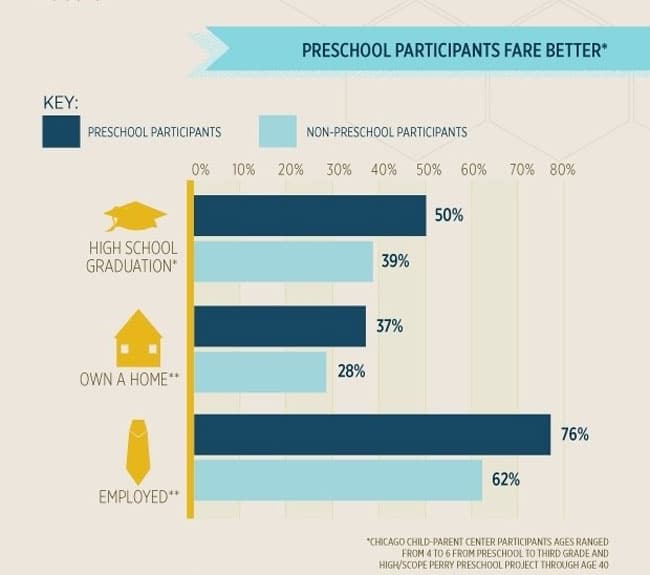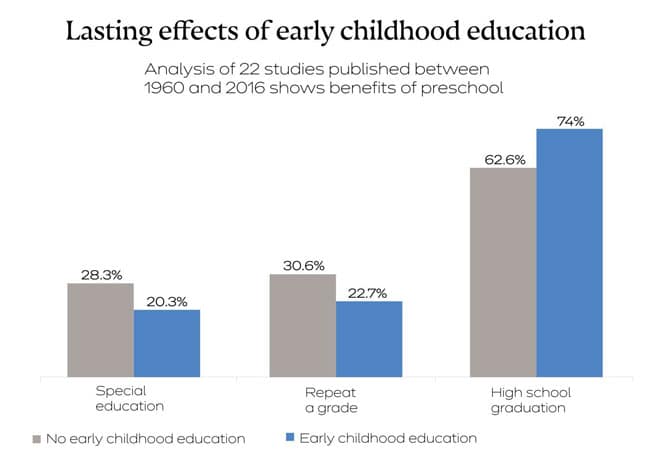Long-term Effects of Early Childhood Education: Beyond Academics
Print This PostBright from the Start: Georgia Department of Early Care and Learning’s (DECAL) Longitudinal Study of Georgia’s Pre-K Program Third Grade Report, released in January 2021, and a webinar hosted by the Hunt Institute featuring a panel of nationally renowned early education experts, provide insight into the connection between high-quality early education settings and long-term outcomes for individuals.
Both the research article and webinar address the data gathered from more than 22 experimental and quasi-experimental studies conducted between 1960 and 2016 to determine overall trends.
While Georgia Pre-K research found significant positive outcomes of early childhood education for students through the third grade, additional research has shown that the impact doesn’t stop there. Participating in high-quality early education is associated with positive outcomes in a wide range of quality-of-life areas, including:
- lower rates of criminal justice involvement,
- higher likelihood of completing high school,
- higher likelihood of pursuing additional education,
- fewer chronic disease illnesses, and
- better general health.
Early education researchers Craig Ramey, Ph.D., of Virginia Tech; Alison Gopnik, Ph.D., of the University of California at Berkeley; Francis Pearman, Ph.D., of Stanford University; and Robert Carr, Ph.D., of Duke University discussed the long-term impacts of early childhood education on individual development and on communities.
The presenters discussed findings from ongoing research, as well as the implications for early childhood education policy and practice, including:
- the Perry Preschool Project—HighScope initiated in Michigan during the 1960s, which has continued to follow the participating children and families into adulthood;
- the Carolina Abecedarian Project, an early childhood study that began in the 1970s and has followed close to 100 children and their families for nearly 50 years;
- studies in New Jersey and Tulsa, Okla., with children from low-income urban districts; and
- a Chicago study comparing 900 preschool participating children and families with 500 children and families.
What They Found

Early childhood education experiences can have long-term effects on decision making and life choices into adulthood. These impacts were found in broad studies of the impact of early childhood education over time. However, studies also have indicated that the effects are most significant in children from high-poverty areas—significantly higher when compared to children from low-poverty areas:
- Children who participated in early childhood programs were less likely to experience grade retention during high school (across multiple studies).
- Students participating in early childhood programs were more likely to graduate from high school than their peers who didn’t participate in quality early education—80% and 60% respectively in the HighScope Perry Preschool Project (other similar rates from multiple studies).
- Adults who had high-quality early child education experiences had more positive social interactions and are more community focused (Abecedarian study).
- Adults who had quality early child education experiences are more likely to be employed full time, own a car, own a home, and have a savings account.
- As older adults, those who participated in quality early childhood programs are more likely to have more positive relationships with family members.
- Participants in quality early education settings were less likely to be placed in special education programs later in school.
- People who attended quality early childhood education were more likely to attend college, have higher SAT scores, and higher high-school graduation rates (based on multiple studies).
- Those who attended high-quality early childhood settings were less likely to be incarcerated as juveniles compared to those who didn’t.
- Individuals who participated in preschool programs earned up to $2,000 more a month as an adult compared to a group of non-preschool attendees. (HighScope Perry Preschool Project).
 What Communities Can Do
What Communities Can Do
Based on the findings from this study, communities can use this information with community partners and activities:
- Continue to support and encourage high-quality early education opportunities within your community and for all families.
- Provide support and resources for existing early education settings to continually improve quality of care by supporting Quality Rated efforts, education for teachers, resources for classrooms, and maintenance of facilities.
- Provide education for families about the importance of quality early childhood education.
- Link families to resources that increase their capacity to provide early education opportunities to their children.
- Help connect families to DECAL resources and subsidies to help families afford quality early education.
- Understand the types of quality early education settings needed within your community (hours, locations) by assessing family needs, work schedules, and locations, and where existing resources are located.
- Support DECAL and Quality Care for Children efforts in communities to provide training to early childhood education settings on the importance of high-quality care and how to continually improve care.
Learn more:
National Bureau of Economic Research, Inc.
econpapers.repec.org/paper/nbrnberwo/28756.htm
Impacts of Early Childhood Education on Medium and Long-Term Educational Outcomes: journals.sagepub.com/stoken/default+domain/ycdsVk2Xu4vSV8gxECVS/full
The long-term advantages of early childhood education infographic: elearninginfographics.com/advantages-early-childhood-education-infographic
New Analysis Finds Long-Lasting Benefits from Early-Childhood Education, Education Week:
edweek.org/teaching-learning/new-analysis-finds-long-lasting-benefits-from-early-childhood-education/2017/11
Virginia Tech Carilion Research Institute researchers find positive effects of early education intervention four decades later: vtx.vt.edu/articles/2018/11/naturecomm-vtcri-112018.html
Virginia Tech Carilion Research Institute scientists show that high-quality, early childhood education has significant benefits: vtx.vt.edu/articles/2017/04/vtcri-earlychildhoodeducation.html
Contact:
Reg Griffin
DECAL Communications Director
404-656-0239
reg.griffin@decal.ga.gov
Bill Valladares
GaFCP Communications Director
404-739-0043
william@gafcp.org
Follow us on Twitter: @gafcpnews
Connect with us on Facebook.
Bright from the Start: Georgia Department of Early Care and Learning is responsible for meeting the child care and early education needs of Georgia’s children and their families. It administers the nationally recognized Georgia’s Pre-K Program, licenses child care centers
